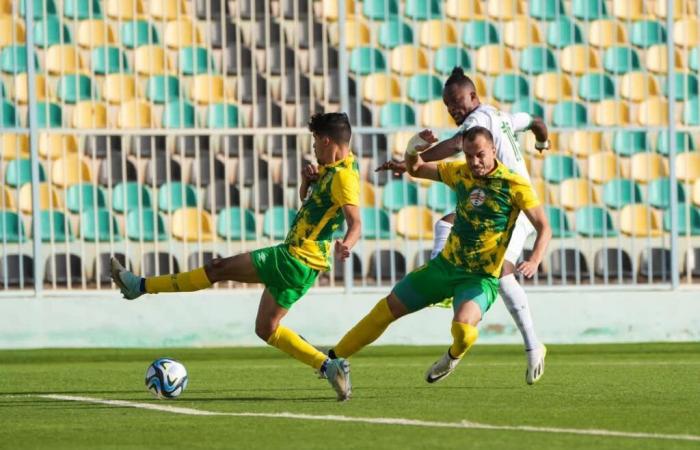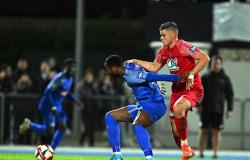Cheick Omar Dabo, the emblematic striker of JS Kabylie during the 2006-2007 season, was chosen as best player and finished top scorer in the Algerian championship during this season. In this exclusive interview, he looks back nostalgically on his experience in the club, recalling the strong moments that shaped his career. Now retired, Dabo also shares his thoughts on transitioning to a new stage in his life, while remaining deeply committed to football and its fans.
So, what happens to Sheikh Omar Dabo?
Azul, currently I am a transit agent and I work in import-export. At the same time, I am responsible for a football school near Le Havre, where I also hold the position of sports director of the first team.
So you are still involved in football…
Yes, indeed, I am still involved in football. I take care of the young people at this small training school as well as the first team. But my job doesn't stop me from playing matches with the veterans whenever the opportunity arises. We can't give up on football that easily.
Don’t you miss Tizi Ouzou?
Of course I miss Tizi, even too much. I'm planning to take a trip there, especially now that I see we're provisionally in first place. So I tell myself that it's the ideal time to go there, see friends again and feel the fervor that animates the city.
Do you still follow JSK?
Yes, I try to follow the team's results in every match, and I stay up to date with the latest news from the club. It's my favorite club, so I try to stay informed about everything related to it. What a joy to see the JSK return to the top of the rankings after years of struggle. She's finally where she deserves to be.
You had some good times with the JSK, didn't you?
One of the most memorable moments I experienced at JSK was the day of my first match with the team. I remember it was in Algiers, against Asante Kotoko. I entered the field and, without waiting, I scored a goal. Turning back to the audience, I was overcome with emotion. It was incredible. I then said to myself: “Ah, so here are the Kabyle people. You're really lucky, Cheick.” I will never forget that day.
A moment of disappointment at JSK?
The last match I played at Tizi Ouzou was particularly moving. I shed tears, because I realized that I was leaving a club which had always cherished me, supporters who had always been by my side. I was leaving a club that I loved with all my heart, and that was painful for me.
What were the major challenges you encountered during your career?
For a professional footballer, it is always a question of aiming for the coronation. A player constantly thinks about winning titles, both collective and individual, but to achieve this he must work hard. This is where the major challenge lies.
How has life after football been for you?
Life after my football career was marked by a smooth transition, thanks to the chance I had to continue my studies while playing football. I had already obtained a BAC +2, which allowed me to bounce back smoothly once my crampons were attached. Rather than seeing the end of my career as an end in itself, I saw it as a new stage, a new chapter to write. I continued my studies, exploring areas that interested me but which I had not had the time to explore in depth during my sporting career. I have followed numerous training courses, each enriching my intellectual and professional background. These new skills have given me a wider range of choices for my future.
Did you have any difficulty adjusting to life without football?
Yes, adapting after a football career is always a big challenge. We move from a world where the adrenaline of the stadiums, the camaraderie of the locker rooms and the incessant pursuit of victory punctuate daily life, to a very different reality. It's another world, another life, another job. There is this widespread belief that for those who have enjoyed glory on the pitch, the transition to a post-career life would be easy. However, the reality is quite different. It's extremely complicated. We not only have to redefine who we are outside of football, but also find new goals, new passions, and sometimes even reinvent ourselves professionally. It is important to know how to manage this transition with wisdom and foresight. This often involves preparing in advance, developing other skills or interests, and building a network outside of the football world.
How did you manage this transition?
The education I received from my parents allowed me to understand all of this from a very young age. I always knew I would retire one day and would have to stop playing football. I knew that a football career only lasts a small part of life, and not an entire existence. This pushed me, on the one hand, to advance in my studies and, on the other hand, to invest my money wisely during my career rather than wasting it. In the end, all of this allowed me to be a little more comfortable after I stopped playing football.
How has your career impacted your personal life?
Look, I've played in several countries throughout my professional career, which often prevented me from being around my family and my children. Even if I saw them from time to time, the fact of traveling through the fields and going through the seasons somehow prevented me from seeing them grow. A football player is faced with experiencing this throughout his football adventures. Since I stopped, I have done everything for the happiness of my children, to stay and always be at the side of my family.
Who was much closer to you at JSK?
Personally, I was close to everyone during my time at the club. We lived like a big family at JSK, but the relationship between me and my president was simply incredible. The late Hannachi was a wonderful, exceptional person. He always made sure we felt comfortable; demanding certainly, but with a big heart. He considered us like his own children. That's why we always tried to make him happy. I will never forget it. Rest in peace, President.
Two of your compatriots are currently playing at the club, Koné and Kanouté. Do you know them? If so, do you think they can succeed at JSK?
I know Koné well, I saw him play here in France. He is an interesting player, both defensively and offensively. I think his profile will be beneficial for the team. As for Kanouté, I don't know him very well, but I hear a lot of good things about him and the way he plays in midfield. They have every interest in giving the best of themselves to JS Kabylie, otherwise…(laughs).
A word to JSK supporters…
JSK fans have always loved me, and I have always loved this club. It's my favorite club, although I am Malian, trained at Djoliba AC and having played in several clubs across different countries. The JSK will forever remain the most memorable story of my career. I will always be a strong supporter of it. In fact, I keep a frame with a photo of me surrounded by club supporters in my office to this day, and I will never be able to part with it. I would also like to tell them to stay behind their team, whatever the cost, because you represent a club recognized worldwide thanks to its history. Be united, and moments of glory will return sooner or later to the Kabyle house, I am sure of it.
- I.






